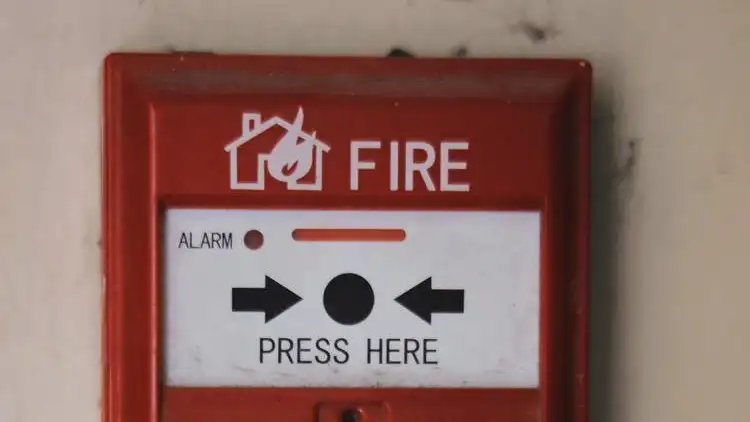Awareness when it comes to fire is an essential part of keeping any building safe, but this is even more essential when addressing the fire safety of a commercial building. Understanding the relevant fire regulations as they pertain to commercial properties and keeping on top of fire safety measures can help you remain legally compliant, boost your health and safety protocol, and keep your building and staff secure in an emergency. Here, we take a closer look at all these factors and see how we can help you.
What is fire safety for commercial buildings?
Fire safety for commercial buildings is quite similar to domestic fire safety insofar as the causes of fires can be similar – kitchen equipment, outdated or damaged electrical items, wiring issues, and careless behaviour being significant contributors. However, when it comes to maintaining fire safety in a commercial building, there are several factors which you should consider. You will need to keep a larger space and group of people informed and safe, as well as ensuring that you keep a completed audit trail of any testing of equipment you have done or are currently doing.
Who is responsible for fire safety?
The responsibility for fire safety in a commercial building can fall on several people associated with it. Keeping up with commercial fire regulations can fall on the property owner, the property management company or independent landlord, the employer, and whoever is occupying the building. If you have a facilities manager or risk assessment professional among your staff, they are also responsible for fire safety.
Of course, it is also essential to keep any onsite staff fully aware of specific fire safety regulations and to make sure that all staff are appropriately trained in fire safety and what to do in case of fires.
What are they responsible for?
When it comes to commercial fire regulations, the responsible parties must ensure that a range of proactive preventative measures are carried out to reduce the chance of fires occurring and that any fires are dealt with appropriately. The responsible person must create strategies and plans to be put in place if a fire does occur and provide appropriate training and information for any employees onsite (both during onboarding and on a rolling refresher basis). They will also need to maintain any measures put in place, carry out risk assessments, specifically of fires, and report these risks to address them quickly.
Fire risk assessments
Fire risk assessments are one of the essential duties held by the responsible person in your commercial building. Along with keeping a logbook regarding your fire safety, these assessments are vital for showing your local fire authority that you comply with commercial regulations.
Risk assessors can perform fire assessments; however, over four employees must be present when recording fire assessments for commercial buildings. If you choose not to utilise a fire risk assessment professional, then your responsible person will need to be able to adequately identify risks and at-risk persons, review equipment and current fire drills and other measures, and update the fire risk assessment regularly.
Commercial fire regulations regarding fire safety equipment
Commercial fire regulations are clear regarding the equipment you must have on-site and how often it should be maintained.
Fire extinguishers
Fire extinguishers must be on-site, including multiple types of extinguishers equipped to handle different kinds of fires (such as chemical fires). You may also need to have sprinklers in place.
Fire extinguishers must be maintained by a competent professional person and will need to have annual maintenance performed to check their safety. You will also need to ensure that they are appropriate in type and position based on your business and building.
Fire dampers
Fire dampers are also a necessary part of your commercial fire safety, and in compliance with the British Standard Guide to Good Practice BS9999 , fire dampers must be tested annually using drop testing and will need to be tested both upon installation and once a year after that. If your commercial building is considered higher risk than a standard office environment, you may need to have fire damper testing and inspections performed by a competent person more regularly. We also suggest that you have a maintenance plan in place so that you can immediately repair any faulty fire dampers or else replace them.
Fire alarms
Fire alarms are a legal requirement for your commercial building, and you will need to have a responsible person (such as a fully trained staff member acting as fire warden) perform weekly testing on your system. You will also need to have your system professionally serviced twice a year to ensure it performs optimally. The alarm should be audible to everyone within your building, and you should have a call point per floor of your building structure.
Safety signage
Safety signage is a legal requirement regarding fire safety in commercial buildings. You will need to display at least a fire action notice outlining how those on-site should proceed in case of a fire and ID signs for your fire extinguishers. This signage will describe the specific type of fire extinguisher and where to find it.
Fire doors
An essential part of your fire safety is that your building possesses the appropriate fire doors. Make sure that these are not left open and that there are no gaps between the door and its frame. Every fire door should be certified and subject to fire door inspections every six months.
If you keep these essential fire safety considerations in mind, you can save your commercial building secure and compliant, avoiding the potentially devastating consequences of negligence in this area.
For further information about fire safety or if you want help and guidance with every element of fire safety, get in touch to find out more about our high quality and expert fire safety services, from inspections of fire doors and dampers to kitchen extract cleaning.

